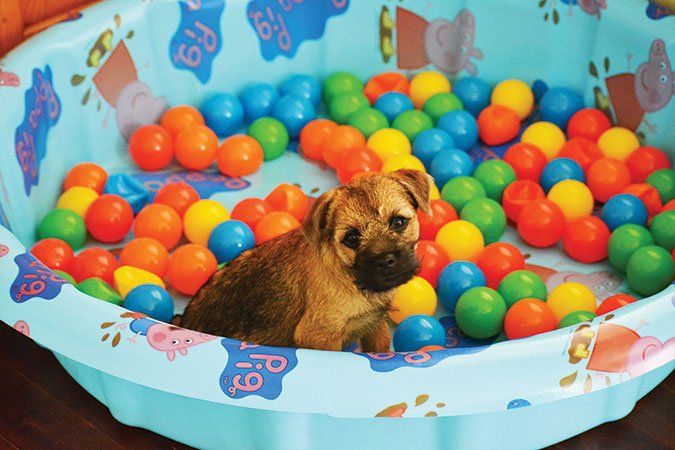I’ve been a professional dog trainer for 10 years. I’ve tackled all kinds of behavior issues ranging from mild annoyances, like jumping up, to serious aggression or anxiety problems.
I’ve doled out training and management advice to dog-owning families expecting babies (of the human kind), guided adopters in their selection of a puppy or adult dog, and counseled clients on what to do after their shiny new puppy finally arrives.
I’ve taught group classes of various themes, including puppy kindergarten – so many puppy classes, I’d heard and seen it all.
What I hadn’t done in forty years, however, was adopt a puppy and bring him into my own home. That’s when I discovered through a somewhat rude awakening that I had more learning to do.
My empathy for my puppy clients has grown tenfold since we brought Bennigan, our Border Terrier, home this summer. Up until then, every dog I had adopted was already an adult at the time of adoption. They each had their own behavior issues, but none of these compared to the challenges I’m currently facing as a new puppy owner.
Puppies are hard work! I thought I knew this, but I didn’t really. I knew it on paper and in theory, but I never expected to feel so incredibly inadequate as a puppy owner. I’ve read some fantastic books and articles on puppy rearing, attended seminars on puppy development, and watched several truly great DVDs that carefully lay out all the important aspects of living with a puppy. What’s missing from all of these resources, however, is some crucial information about the realities of living with a puppy.
Here, I’d like to add my own chapters to every puppy book, article, and DVD I’ve ever learned from. This is the nitty-gritty of puppy rearing that I wish I had received a heads-up on.
Armed with this knowledge, puppy adopters will be in a better position to recognize that what they’re living through is normal. They are not failing, their puppy is not evil incarnate, and they will absolutely not be able to accomplish all the tasks outlined in all the best puppy books before their puppy’s socialization period is over (and that’s okay).
So here they are – the missing chapters, in no particular order.
1. You Will Be Tired
Actually, you will be exhausted. It’s common knowledge that puppies will likely not sleep through the night and will need a potty break at some point in the middle of your REM sleep. It sounds simple and easy enough to deal with (after all, it’s only temporary). But all those waking hours you spend with your puppy during the day will drain every ounce of energy you can muster. That means that those interrupted nights will feel more difficult because you will be going to bed more exhausted than you normally are.
Then, when you get up in the morning, you’re already sleep-deprived and your energy resources are depleted. But your puppy is in fine form! Repeat this night after night – it doesn’t take long before you feel you’re dragging yourself through your day, hoping your head won’t hit the table in the middle of an important meeting by 2 p.m.
It’s impossible to say when your puppy will finally begin to sleep through the night. For some lucky families, this happens sooner than later. I was one of them; Bennigan began sleeping through most nights starting at 12 weeks old. But another trainer friend’s puppy didn’t quite get to that point until well after 20 weeks of age.
MY ADVICE: If you can sneak in a 10-minute nap during the day, no matter where you are, do it! I’ve managed to replenish some precious energy during the day by simply laying my head on my desk for just a few minutes, or sitting outside and closing my eyes momentarily. I’ve even stolen a few winks in my parked car. Every little bit helps. Oh, and remember to silence your phone during your emergency nap.
2. You May Lose Your Cool
The fatigue is going to catch up to you at some point, and as much as you love your puppy and would never dream of harming him in any way, you will reach your boiling point sooner than you normally would. You may do whatever it is you usually do when you lose patience; for some people, that’s raising their voice at their puppy. For others, it might mean snapping at other family members. Whatever “losing your cool” means to you, you will do it.
First, know that it’s normal. Don’t be too hard on yourself if you do lose patience. When I first admitted to my trainer friends that I was experiencing a surprising level of fatigue and frustration, I was incredibly relieved to hear that they had been there too, once upon a time. Some revealed they had been reduced to tears on more than one occasion.
There are so many mixed emotions involved in raising a puppy. You are totally smitten by the massive amounts of cuteness, and yet wrapped up in that adorableness is also a tiny creature endlessly exploring his world and expressing every need and emotion in a most immediate and unfiltered way.
He may vocalize in ways and at times you don’t expect, and for reasons you’re not quite sure you can identify. His demeanor will change suddenly – from playful to sleepy; from restful to cranked up and bitey; from calm to “hangry” (hungry and angry). I can’t tell you how many clients have called me over the years, convinced their dog is “attacking” them. I never quite understood what they meant until I experienced it myself. More on that later…
Everything is new to him and must be investigated. Every single thing. He will notice items in his environment that you haven’t. He will find them, and he will pick them up with his mouth (or test it by chewing on it). For his safety, he must be watched constantly. No matter how puppy-proof you think your home or yard is, he’ll find at least 20 ways it isn’t!
All of these scenarios, coupled with the fatigue you’re enduring, will shorten your fuse. This is the moment you wonder what you’ve gotten yourself into and whether you’re up for the task. You are not alone!
MY ADVICE: Do something for yourself as often as you can. Much like the tiny power naps, you’ll need to steal these moments whenever you can – usually while your puppy is sleeping. Also, talk to other puppy owners, or to adult dog owners who have been through this themselves and who can tell you that there is a light at the end of the tunnel. When you realize that everyone else has felt the same way, it’s a huge morale booster.
3. Say Goodbye to Your To-Do List
I am a list-maker. I tend to add items to my daily list almost as often as I check off a completed task. This habit transforms it into a perpetual to-do list, a challenge to complete even under the best of circumstances – in other words, without a puppy in the picture.
With a puppy, I’ve been lucky to get through even a single task on my list! I’ve learned to either toss the list aside during these early weeks, or to at least whittle it down to just the basic necessities. Because the truth is, it won’t get done.
There’s no use causing yourself frustration by assigning yourself tasks that you can’t reasonably get around to doing. Lose the list, or cut it down, or delegate the tasks to others if possible.
MY ADVICE: On a personal note, I found it far more important during the early weeks to focus on taking advantage of my puppy’s socialization period to do things with him, rather than worry about which household chores weren’t getting done. The house has been a fine mess since our puppy arrived, and I’m okay with that.
4. Is Your Puppy Possessed?
I mentioned earlier how there have been moments in my career when I’ve received calls from puppy owners concerned about their dog’s temperament. “He’ll just suddenly attack us out of the blue,” they’ll say. “I think there’s something wrong with him. He’s really aggressive!”
I think I can count on one hand the number of times I’ve met the puppy in question and actually referred to a veterinary behaviorist, based on behaviors I found worrisome. Otherwise, what I usually witnessed appeared to be very exuberant puppy mouthing and biting, often from an overtired puppy who simply needed some quiet time and a nap, or from a puppy who was under-stimulated and needed more outlets for his bottled-up energy. Either way, it was usually nothing to worry about.
And then one day, out of the blue, Bennigan looked like a puppy who had – for all intents and purposes – gone berserk. It started with a sudden case of the zoomies (when your dog runs at full speed rather erratically with his ears back, eyes wide, and his butt tucked beneath him). The next thing I knew he charged at me and climbed my leg. He began tearing at my pant-leg with his little shark teeth while emitting a most dramatic growl and whine. There was simply no calming him, no distracting him, no getting away from him. It was quite distressing!
In the end, I scooped him up with my hands while he wriggled violently, and put him in his crate. I shut the door in one swift motion and attempted to catch my breath. What on earth was happening? I had lost complete control over my tiny puppy, and he had turned into an angry, fanged beast!
Within two minutes he was fast asleep, but almost as quickly, he was awake again, barking and howling from his crate. I took him out immediately (this is no time for “discipline,” nor is it a “teaching moment” – puppies are babies, and this type of behavior announces a need that hasn’t been met). Although it wasn’t officially his feeding time, I fed him a small portion of his food on the spot.
Just like that, Bennigan was calm again. He went right back to sleep and awoke a happy, playful puppy after a long nap.
Over the following days and weeks, I learned that a combination of hunger and fatigue produces this type of behavior in my puppy. It’s not often that both circumstances happen at the same time, but when they do, I can now tell long before things get out of hand, and Bennigan gets a little food and a nap.
Had I not witnessed this type of over-the-top behavior myself, I would have thought my clients may have been exaggerating in their description of the event. It was truly quite dramatic and upsetting. I thought of videotaping Bennigan’s behavior to show other trainers, but it only happened a couple of times before I figured out the puzzle, and I was far more focused on handling the issue than filming it!
MY ADVICE: Find out what your puppy needs. At such a young age, a puppy’s needs are really quite simple: Is he hungry? Is he over-tired? Does he need to relieve himself? Is he all alone? Chances are, responding to these four questions will resolve the issue.
5. When it Comes to Socialization, Do Your Best
As a trainer and behavior consultant, I’m painfully aware of what can result from too little or poorly executed socialization. That’s why I emphasize the importance of proper and timely socialization to all my clients with puppies. I give them a long list of socialization tasks to accomplish, ideally before their puppies reach 12 weeks of age. “You really don’t want to let this slip,” I say. “If you do only one thing for your pup over the next few weeks, make sure it’s this!”
Well, ha ha; the joke’s on me. I wasn’t able to complete even half of the tasks I recommend to my clients! I’m self-employed with a flexible schedule, have no kids in the house, am healthy and fully mobile, and have a spouse who can help. Plus, I’m a professional trainer! And yet, I couldn’t do it. I can’t imagine how someone with a full-time job and kids could possibly execute a “perfect” socialization program!
MY ADVICE: Seriously consider what canine social skills your dog will really need and focus your precious and limited time on those. Yes, in theory your dog will have a better crack at being super-well socialized if you can offer him a massive array of positive experiences – there’s no doubt about that. But if out of a list of 100 experiences you can realistically tackle only 20 of them, pick the 20 that most closely match what you need your dog to be familiar with when he’s an adult. (My puppy did not get to meet farm animals, for example, and that’s okay, because the likelihood of that type of encounter taking place in the future is slim. While it’s an excellent idea, it was not a priority!)
Thanks to the discovery that I was unable to cross off half of the items on my usual socialization checklist, I’ve now made some changes to my puppy consults. For starters, my advice sounds a little more like this: “Look, ideally, here’s what I’d like you to do. Try your best. Be kind to your dog. Roll in the grass with him. Be patient. Buy yourself some wine. Send me an email when you’re so tired you just want to cry but are too embarrassed to admit to your non-dog-owning friends that an eight-pound puppy is kicking your butt.” Because honestly, this is the more likely scenario!
They Grow Up So Fast
In the end, it’s less about doing everything perfectly and more about setting your own priorities. What do you really need your puppy to know when he’s an adult? Focus on that.
Do your best to cover the material presented in all those terrific books and DVDs – and the syllabus from the puppy kindergarten class you’ve signed up for (definitely enroll in one of those) – without stressing over accomplishing all the recommended exercises. Give yourself the benefit of this “missing material,” and take some pressure off your shoulders. By the time you and your puppy have graduated from a puppy kindergarten class or two, you will likely be handling much of your puppy’s relentless, curious, adorable behavior with aplomb . . . and will have a good foundation on which to prepare for mystifying canine adolescent behavior!
Remember to take a moment to acknowledge everything you’re doing right, and don’t worry too much about there being something wrong with your puppy (there very likely is absolutely nothing wrong with him), or about feeling like you are an inadequate trainer. Believe me, even the pros feel this way!
Enjoy your dog’s puppyhood while it lasts. Take lots of pictures and take the time to laugh, play, and bond. You’ll be just fine.
Nancy Tucker, CPDT-KA, is a full-time trainer, behavior consultant, and seminar presenter in Quebec, Canada.







This is very frustrating. I just subscribed but am still locked out from reading the articles. Please help!
Thank you for all the tips, it was very helpful.
Great article !!
Thank you for the informative post.
Thank you for this. It’s just what I needed to read at this time!!
This is one fantastic article and I am so glad I read it. I have had my mini Bernadoodle for about 6 days now and am amazed at the concentrated time he takes. I raised 3 daughters and 2 granddaughters and I have to keep telling myself he is just a baby. He was 8 weeks old when I got him. I had another puppy who was 12 weeks old when I got him, but I don’t remember being this tired and involved in his training and growth ( I was younger then too.) Thanks for the support.
there are a number of reasons i chose not to have children, not the least of which is the stress and exhaustion and anxiety. well, the joke’s on me! now i have a puppy and it’s a good thing i’m between jobs, because it is a 24/7 responsibility filled with all kinds of difficulty i never saw coming. thank you so much for acknowledging this in your article. i will never again encourage someone else to get a puppy, as this is clearly a decision that requires more serious consideration. we are thrilled with our ‘new baby,’ but i have never been so haggard in my life.
I needed this topic today as the proud new “mom” of a 15 week old Aussie. He’s been so good and relatively easy, but just like with human babies it’s easy to start to feel like you’re doing it all wrong and are somehow harming your “baby”. Thank you for the reassurance that I’m probably not!